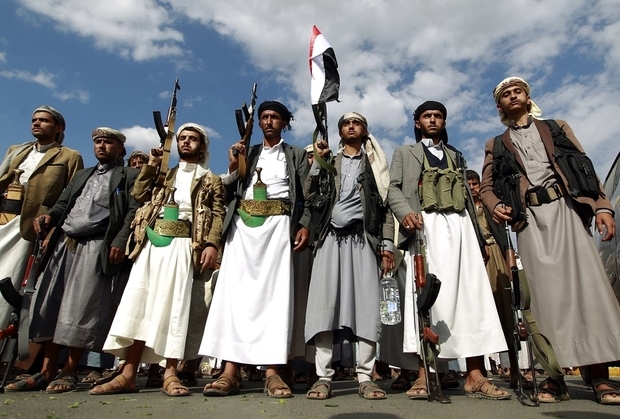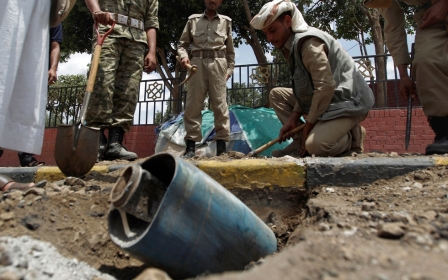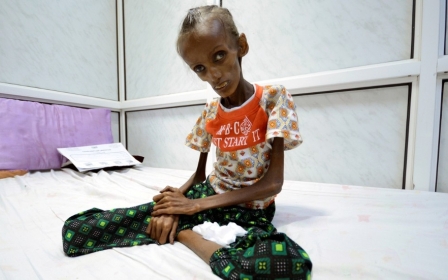Yemen: Despite famine crisis, wheat imports are halted

Yemen's biggest traders have stopped new wheat imports amid a crisis at the central bank, documents seen by Reuters show, another blow to the war-torn country where millions are suffering acute malnutrition.
Almost two years of war between a Saudi-led Arab coalition and the Iran-allied Houthi movement have left more than half of Yemen's 28 million people "food insecure", with seven million of them enduring hunger, according to the United Nations.
At the same time, aid agencies are warning that Yemen – the Arabian peninsula's poorest country – is on the verge of famine, although they have yet to declare one.
Trade and aid sources say the situation was compounded in September when Yemen's exiled president, Abdrabbuh Mansour Hadi, ordered the central bank's headquarters moved from the capital Sanaa, controlled by Houthi rebels in the north, to the southern port of Aden, the seat of the new government.
This has led in effect to a de facto partition, with rival institutions in the north and south.
In Yemen, a child dies every 10 minutes because of malnutrition
Hadi's government said the Houthis had squandered some $4bn on the war effort from central bank reserves. the Houthis said the funds financed imports of food and medicine.
In a 30 November letter addressed to Yemen's trade ministry in Saana, which the company had dealt with before Hadi's decree to move, leading trader Fahem Group, said: "We would like to inform you that we have been unable to conduct any new contracts for wheat as local banks cannot transfer dollars for the value of any wheat cargoes."
Fahem Group said in the letter, seen by Reuters, that it wanted to continue importing wheat to cover the population's needs but was unable to open letters of credit.Bread forms a major part of people's diet in Yemen.
Even before the move, the central bank, aiming to shore up dwindling foreign currency, had stopped providing guarantees for importers, leaving them to finance shipments themselves.
Saudi Arabia and allied Gulf states began a military campaign in March last year to prevent the Houthis and forces loyal to ex-president Ali Abdullah Saleh from taking control of the whole country after they deposed Hadi in late 2014.
Fahem Group imported an estimated 1.2 million tonnes of wheat into the Red Sea port of Saleef between April 2015 and April 2016, which accounted for between as much as 40 percent of Yemen's total wheat imports, according to trade estimates.
A separate letter, also addressed to the Houthi-run authorities in Sanaa by major importer Hayel Saeed Group and other large traders, said those firms had stopped new wheat shipments and urged resolution of the financing problems.
Together, those groups accounted for almost all the rest of the wheat imports.
Central bank crisis
A source with the central bank in the Houthi-controlled capital Sanaa said it had no access to foreign reserves at all.
"Importers will have to turn to the Aden central bank for access. This is something outside of its control," the source said.
"Wheat imports have stopped since a little less than a month (ago) and the reserves are around two months now as some prior deals are arriving."
The trade ministry in Sanaa did not respond to requests for comment.
Monasser al Quaiti, the governor of the central bank in Aden, and the trade ministry in Aden could not be reached for comment. Quaiti, who was appointed by Hadi, has previously said the bank has no money.
Jamie McGoldrick, UN humanitarian coordinator for Yemen, told Reuters, when contacted about the letters: "With this notification by these food importers, they are going to find it challenging, difficult, and maybe even impossible to bring in the wheat for a period of time now."
Aid agencies are bringing in wheat, but can only cover a fraction of food import requirements, partly due to a lack of funding.
When asked for comment, Brigadier General Ahmed al-Asseri, spokesman for the Saudi-led coalition, said the Houthis were deliberately blocking wheat and aid shipments, pointing to cargoes being held up at the Red Sea port of Hodeidah.
"The Houthis try to play this card of the starvation of people to gain more international media attention," he told Reuters.
The rebel Houthis have accused Saudi Arabia and its allies of imposing a blockade on Yemen. Representatives for the Houthis could not be reached for comment.
Food crisis
Supplies are still reaching many parts of Yemen including Hodeidah and Aden, but other areas, particularly Ta'iz in the south, Sa'ada in the north, Shabwah in the centre and Al Maharah in the east have struggled to get deliveries amid the fighting, data from UN agencies showed.
More recently there were shortages of vegetable oil, wheat flour and sugar in those areas, although precise details were not available from any agency.
The price of wheat flour and sugar were about 25 percent higher in November on average across Yemen than they were before the conflict, the data showed. The volume of fuel imported in November was only 40 percent of Yemen's monthly requirements.
UN children's agency UNICEF has said malnutrition among children is at an all-time high with nearly 2.2 million in need of urgent care – a spike of almost 200 percent since 2014.
Salah Hajj Hassan, UN food agency FAO's representative in Yemen, said the decision to transfer the central bank to Aden "will have a devastating effect on the already deteriorating economic performance".
"Traders who are engaged in importing food are worried that, unless alternative arrangement is foreseen, this decision will leave them financially exposed and make it harder to bring in supplies in Yemen," Hassan told Reuters.
Aid Oxfam warned this month that based on current food imports, Yemen will run out of food in a few months.
"Yemen is being slowly starved to death," said Mark Goldring, chief executive of Oxfam GB.
Shipping and aid sources said even ships that are prepared to berth must wait in line to offload their cargoes. This, together with mounting insurance costs and uncertainty about exchange rates and accepted currencies at the ports, has led to more delays, as well as higher and more volatile prices.
The United Nations says both sides are holding up aid deliveries and set up its own verification and inspection mechanisms at the start of this year to try to solve the problem.
New MEE newsletter: Jerusalem Dispatch
Sign up to get the latest insights and analysis on Israel-Palestine, alongside Turkey Unpacked and other MEE newsletters
Middle East Eye delivers independent and unrivalled coverage and analysis of the Middle East, North Africa and beyond. To learn more about republishing this content and the associated fees, please fill out this form. More about MEE can be found here.







